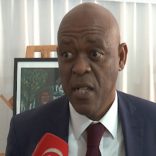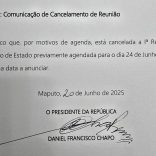Mozambique, European Union strengthen cooperation
Government made a mistake in allowing the occupation of Mocímboa – researcher

Image: ISS Africa
A researcher at the Armed Conflict Localization and Event Data Project (ACLED), Jasmine Opperman, warned on Wednesday (04-11) that the Government of Mozambique had made a mistake in allowing rebels to occupy Mocímboa da Praia, pointing out that there were being joined there by “free and willing” recruits.
“One of the biggest mistakes the Government has made is to allow the insurgents to occupy Mocímboa da Praia for a sustained period of time, because we have seen new recruits going and joining them freely and willingly,” Opperman told a webinar organised by the Institute for Security Studies (ISS Africa) titled “Maritime security could turn the tide against Cabo Delgado’s insurgents”.
Opperman pointed out that “there is a perception” that recruitment was taking place only by way of kidnappings, but that in the case of Mocímboa da Praia, a village in the province of Cabo Delgado, which has been the target of actions by fundamentalist Islamic rebels, “this is not the case”.
Opperman is concerned by information on foreign-led training operations carried out in Mozambican territory.
It is necessary to “understand what is happening” and not to ignore “the sudden increase in the sophistication of the insurgency”, she pointed out.
There was a cause which “is not about greed”, but about “an identity around a specific belief system, to achieve certain goals”. “There are combatants who are willing to die for the cause they are fighting for, and it is important to realize that,” she said.
Opperman also said that “internal cohesion” was being created through violence.
“This [the attacks] are not only used to alienate civilians from Cabo Delgado, but also to send a message to new recruits that ‘if you dare leave, this is what will happen to you’,” she said.
It must be remembered that many of those kidnapped were young boys, and “easily indoctrinated”.
Opperman also suggested that the attackers’ motivation “is not static”, and that Cabo Delgado insurrection had already passed beyond its “initial phase of indiscriminate brutality”.
Opperman also pointed out that the “complete social disintegration in Cabo Delgado” led young people to identify with the rebels, while there was no recognition of this reality at national, regional, continental or international level.
“The Government needs to look at its security and communication infrastructure” and “to open up to full cooperation”, she advocated.
Maritime security could turn the tide against Cabo Delgado’s insurgents
The seizure of Mocímboa da Praia by insurgents added a maritime dimension to the already complex conflict in northern Mozambique. By controlling the port and rendering the coastline insecure, the ISIS-inspired insurgents could prevent Mozambican security forces from launching sea-borne operations to dislodge them.
The oceans are an enabler for violent extremists all along Africa’s east coast. Maritime security can’t guarantee results alone. But it can sever a lifeline that armed groups depend on and complement resolution measures on land. This seminar will debate whether the insurgents have committed costly maritime mistakes and how a Southern African response could gain the initiative on land through maritime actions. Speakers will also consider the implications of government losing control over the Cabo Delgado coastal area.
Chair: Timothy Walker, Maritime Project Leader and Senior Researcher, ISS Pretoria
Speakers:
Kelly Moss, African Maritime Security Researcher, Stable Seas, One Earth Future
Jasmine Opperman, Armed Conflict Location and Event Data Project
Watch the ISS seminar below.













Leave a Reply
Be the First to Comment!
You must be logged in to post a comment.
You must be logged in to post a comment.